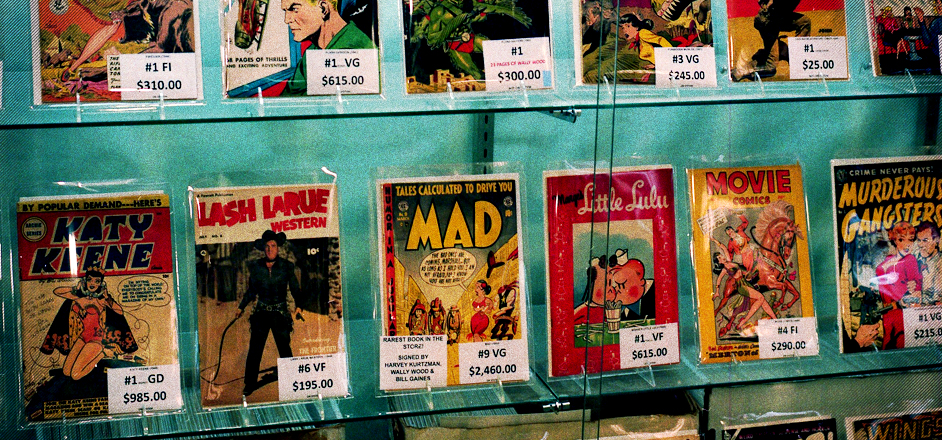
The first thing I notice when I walk into the warehouse that makes up Mile High Comics, America’s Largest Comic Book Store, is the smell of books — like a public library or used book store. It’s strong, yet welcoming. Immediately I feel at home being the cartoon and comic book nerd that I am. Compared to the owner (Chuck) and employee (Lisa) who are hanging out in the front, I am a probably the level below novice, if one even exists.

I gravitate towards the glass case in the front. It’s brightly lit with florescent lights and stands out compared to the dimness of the rest of the place. My jaw drops when I see a price tag that is more than my yearly salary.

If the place seems big, it’s because it is. The 45,000 square foot space holds over 10 million comics. I’m having trouble sorting through all the material when Chuck finds me and tells me he "has something cool" he wants to show me. It’s his book collection of about 260,000 items customers don’t normally have access to. I feel like a V.I.P when he lifts up the velvet rope to let me into the restricted area.

He has me rub my hand along a selection of books protected in crisp plastic telling me it feels “incredible” — spoken like a true book enthusiast. He’s right, it feels amazing. He estimates that over 5 million dollars worth of material is in this section alone, and he is adamant that he doesn’t have the desire to sell them, at least not quickly.

Don’t be fooled by the miscellaneous boxes and stacks of comics. There is a system and the store is incredibly organized. Chuck stays after hours to organize and sort the comics and he has a guy come in for the night shift to help arrange them after the day is over.

Chuck’s goal for each day is to close with more quality items than they opened with in the morning. Sellers come throughout the day with boxes of comics and toys along with stories of why they are parting — break up, divorce, marriage, etc.
The store's website looks like it was made in the early 2000’s but again don’t be fooled. It is updated daily and just like the shop, it is incredibly organized for fans to sort through.


The place exhales with genuine pride. It acts as a museum with memorabilia, life size action figures, cardboard cutouts from movies and comic books ranging from $3 to the five digits. Chuck doesn’t really care for the mainstream comics though, he’s a fan of small publications that produce underground comics. His favorite era is the '70s.

As he is giving me the inclusive tour, I pass some Rick and Morty comic books and I try my best to stay focus on what Chuck is telling me. I make a mental note to return to the paperbacks after he finishes showing me the backroom. Again I find myself in an 'employees only' zone, though this room operates a little differently than the rest. Minus the loading dock, the room is specifically for Feeding Denver’s Hungry, a charity organization Chuck works closely with. They feed about 10,000 people a week and organize the food items right there in the shop.
Chuck's a very busy guy, and admits he’s getting over a terrible bug. I tell him he’s working too hard and that’s probably why he is sick. He tells me I’m not the first person to say that to him. …


My tour concludes and Chuck goes back to sorting through boxes of comic books. I spend five minutes going through the Rick and Morty comics I saw earlier before deciding on three. I wait patiently behind a guy buying a Star Wars toy set. He scolds his friend for not getting anything. Lisa rings me up and gives me a friendly discount.
I thank both and walk out of the store as the proud new owner of some comics.




Leave a Reply
You must be logged in to post a comment.